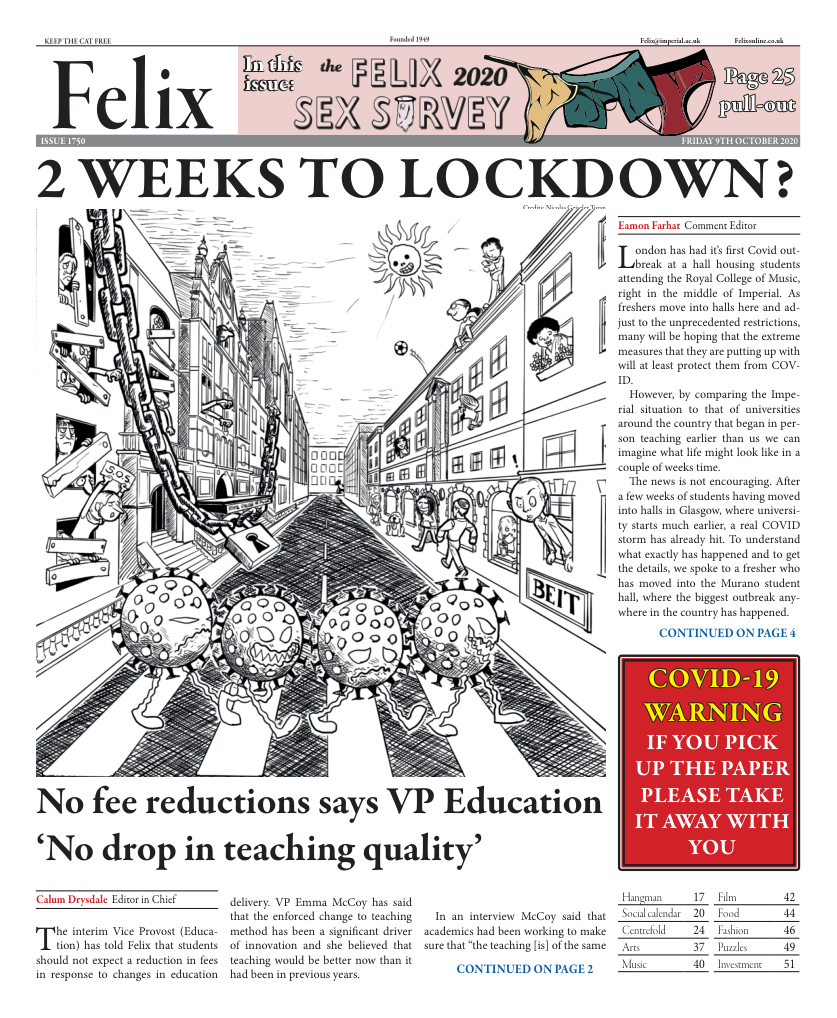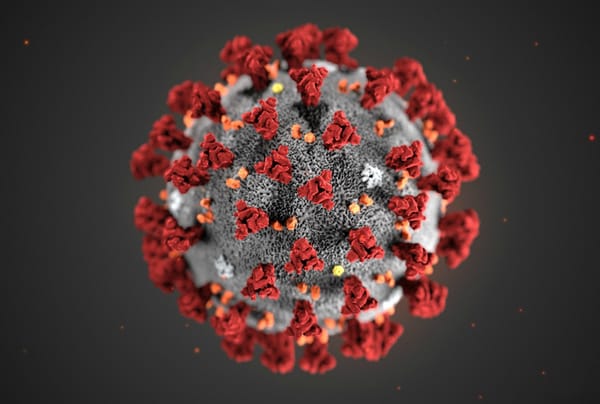2 weeks to lockdown?
Major breakouts at Glasgow and the Royal College of Music suggest we are weeks from lockdown.
London has had it’s first Covid outbreak at a hall housing students attending the Royal College of Music, right in the middle of Imperial. As freshers move into halls here and adjust to the unprecedented restrictions, many will be hoping that the extreme measures that they are putting up with will at least protect them from COVID.
However, by comparing the Imperial situation to that of universities around the country that began in person teaching earlier than us we can imagine what life might look like in a couple of weeks time.
The news is not encouraging. After a few weeks of students having moved into halls in Glasgow, where university starts much earlier, a real COVID storm has already hit. To understand what exactly has happened and to get the details, we spoke to a fresher who has moved into the Murano student hall, where the biggest outbreak anywhere in the country has happened.
The situation is now very bad. Hundreds of students are locked down in their flats. The questions on every-one’s mind is could the students or the university have put in place measures to avoid this or is the fate of Murano one that will be replicated in halls across the country including at Imperial.
With lectures, societies and sports all online, Dan explained that it was difficult to get a sense of community. “It’s either you sit in your room, and waste the first week of fresher’s when you’re meant to try to meet people and get some form of a social group going so that you’re not alone during the first part of uni or you just don’t get sick. So it really is no competition in people’s eyes.” Coupling this with the fact that social distancing was just not possible in student halls, Dan told Felix that everyone accepted they would get the virus saying it was “mutually agreed upon” and “unavoidable”. Social gatherings in halls which were definitely the big spreader had to happen as there was “no other way to meet people” as online events did not work in practice.
Some efforts were made by police to enforce social distancing, with about 30 officers patrolling the hall every night, according to Dan, breaking up social gatherings. The lack of consistency in the actions of these officers hinted that no official guidance had been given to them with how to deal with the unique situation presented to them by the halls of residence.
After about a week, students in the hall started developing symptoms, these would usually last just a few days and they would feel better. When some students did go and get tested and returned a positive test the whole flat would have to self isolate with the accommodation services plastering a “do not enter” sign on the flat door. In Dan’s case, it took him 3 days to get a test after developing symptoms and the walk in center was 40 mins across town (there has since been a mobile unit set up outside the hall). Once in self isolation, students could use their kitchens and bathrooms, and some neighbouring flats which were both in self-isolation would hang out together. In flats with high risk people, the other flatmates took extra precautions.
The mental toll of this was quite hard Dan explains, “It’s it’s very much sort of everyone in the same boat kind of mentality, but it’s also quite dim because everyone’s aware that this was not what the beginning of university is meant to be like and that we’re sort of missing out on this really enjoyable, fun experience where kids are really meant to come out of their own shells and really explore new territory and meet new people.” Th ere is no longer the sense of FOMO which was around during the first week as everyone was self isolating and students were looking forward to putting this all bring them and being able to have some freedom back. “Students kind of need a light at the end of the tunnel in order for them to sort of maintain their morale.”
New students have been moving into halls over the last two weeks, and although many of them and the College as well have taken extraordinary COVID measures, Dan believes this is not enough.
Most of the measures employed by the two universities are very similar with Imperial seemingly going a step further by treating self isolating students with more precautions by moving them to ensuite rooms and not letting them out under any circumstances. However, there doesn’t seem to be much in terms of provisions for food, laundry cleaning or access to wellness activities. Being cooped up in a room for 14 days can definitely take a toll on the freshers.
Without putting in proper measures, the risk of students not following the proper channels and taking the self isolation into their own hands is very possible.
A former Woodward resident who also went on to be a hall senior at Pembridge said the following “Whether it be the Woodward lift s shared by hundreds of students or the Wilson house narrow interminable hallway, or the kitchen shared by over 20 people in Pembridge, there is no way infections won’t spread like wildfire if Imperial doesn’t put further measures in place.”
After a lot of media coverage and controversy, Glasgow eventually agreed to refund 4 weeks rent to students self isolating and give them a bit of money to spend on food delivery, Imperial hasn’t made the same commitment but a similar controversy could push the same thing to happen.







